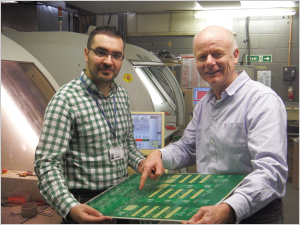Apr 9 2014
Scientists at the University of Southampton are aiming to develop a handheld testing device to provide same day diagnosis from a patient’s bedside.
 Dr Themis Prodromakis with Philip King
Dr Themis Prodromakis with Philip King
In the fictional Star-Trek universe, the tricorder was used to remotely scan patients for a diagnosis. The new device could replace the current conventional diagnostic method, which is lengthy and is limited to single point measurements, due to the prohibitive costs and sample volumes required, preventing continuous monitoring of disease progression.
The research, which is led by Dr Themis Prodromakis, will develop hybrid technology using electronic components as chemical sensors on printed circuit boards (PCBs). The device can carry out diagnosis on the same day and at the point-of-care – potentially avoiding the need to send protein samples away to laboratories for chemical assessment and diagnosis.
Consequently, the new device could lead to public health benefits in reducing the time to treatment and reducing costs in both diagnosis and late-diagnosis treatments.
Dr Themis Prodromakis, a Reader in Nanoelectronics and EPSRC Fellow at the University of Southampton, says: “A project of this nature is the perfect illustration of how academia, manufacturing and the end user can come together to pool their knowledge and experience to make a real and valuable change. There is a real opportunity for this new diagnostic tool to make a tangible difference to healthcare not only in the UK but in international markets as well.”
The project is in collaboration with researchers in the Department of Infection and Immunity at Imperial College Healthcare NHS, who will carry out all clinical trials throughout this three-year project, and Newbury Electronics, a leading manufacturer of PCBs in the UK who will bring their extensive knowledge of manufacturing techniques and materials to this innovative work.
Philip King, director at Newbury Electronics said: “We are delighted to have been appointed as the manufacturing partner for this project. Themis and his team have come up with an exciting alternative to more traditional diagnostic methods and it is now our job, as the expert manufacturers, to help transform this idea into a feasible product. The inclusion of Imperial College as the clinicians to demonstrate the relevance of this research ensures that valid input from all sides is incorporated right from the initial stages.”
The research is being funded by a £1 million grant, awarded by the Engineering and Physical Sciences Research Council (EPSRC). Dr Prodromakis and his team are currently working with Newbury Electronics to gain a better understanding of the PCB manufacturing process and how this can be refined and amended to use alternative materials and to finer degrees of accuracy. If the development work goes to plan, the first prototypes should be available for initial testing by next year.